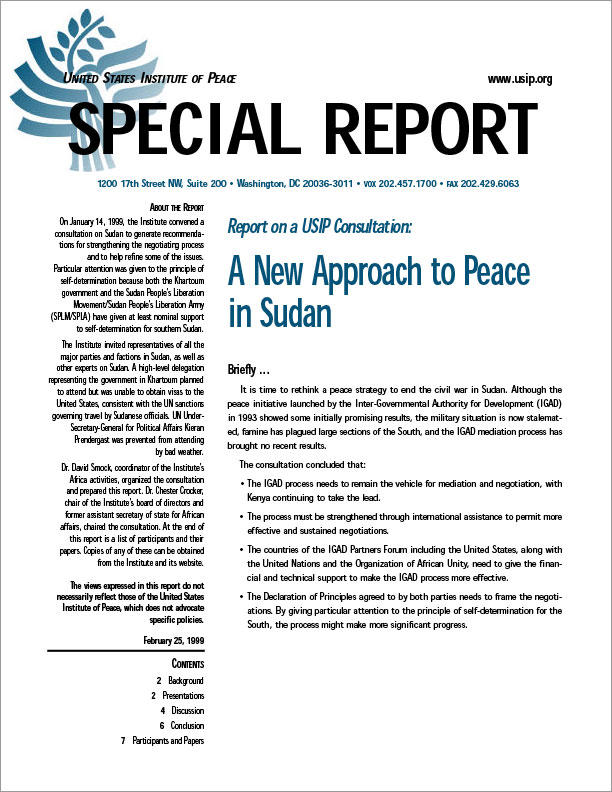Special Report No. 45

Summary
It is time to rethink a peace strategy to end the civil war in Sudan. Although the peace initiative launched by the Inter-Governmental Authority for Development (IGAD) in 1993 showed some initially promising results, the military situation is now stalemated, famine has plagued large sections of the South, and the IGAD mediation process has brought no recent results.
The consultation concluded that:
- The IGAD process needs to remain the vehicle for mediation and negotiation, with Kenya continuing to take the lead.
- The process must be strengthened through international assistance to permit more effective and sustained negotiations.
- The countries of the IGAD Partners Forum including the United States, along with the United Nations and the Organization of African Unity, need to give the financial and technical support to make the IGAD process more effective.
- The Declaration of Principles agreed to by both parties needs to frame the negotiations. By giving particular attention to the principle of self-determination for the South, the process might make more significant progress.
The international community has in the past year been clearer about its goals and more forceful in its means. While there have been noticeable improvements and progress, there is still much more to be done in the area of civilian implementation to meet the basic conditions for peace and stability that were laid out at Dayton. What follows is a brief description of progress since Dayton and a road map for securing a sustainable peace and functioning state in Bosnia and Herzegovina.
About the Report
On January 14, 1999, the Institute convened a consultation on Sudan to generate recommendations for strengthening the negotiating process and to help refine some of the issues. Particular attention was given to the principle of self-determination because both the Khartoum government and the Sudan People's Liberation Movement/Sudan People's Liberation Army (SPLM/SPLA) have given at least nominal support to self-determination for southern Sudan.
The Institute invited representatives of all the major parties and factions in Sudan, as well as other experts on Sudan. A high-level delegation representing the government in Khartoum planned to attend but was unable to obtain visas to the United States, consistent with the UN sanctions governing travel by Sudanese officials. UN Under-Secretary-General for Political Affairs Kieran Prendergast was prevented from attending by bad weather.
Dr. David Smock, coordinator of the Institute's Africa activities, organized the consultation and prepared this report. Dr. Chester Crocker, chair of the Institute's board of directors and former assistant secretary of state for African affairs, chaired the consultation. Papers are available by contacting usip_requests@usip.org or by calling 202.429.3828.
The views expressed in this report do not necessarily reflect those of the United States Institute of Peace, which does not advocate specific policies.